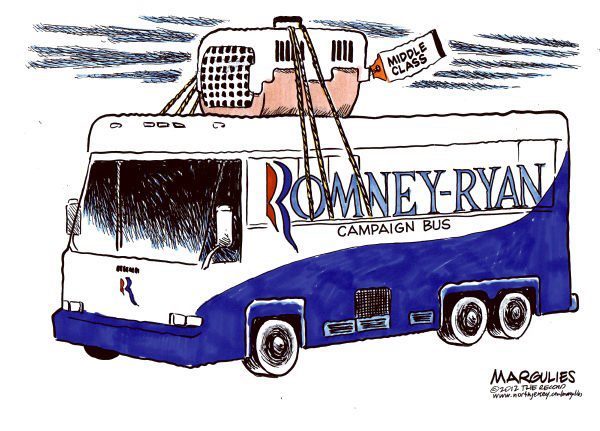
An ideology without promise
In fact, the video confirmed an existing stereotype of Romney and Republicans as wealthy white businessmen, clinking wine glasses while bemoaning the irresponsibility of the help. This probably does not change the fundamental dynamic of the race, because few imagined Romney to be a closet populist. The problem for Romney is that the fundamental dynamic is not favorable. A nation disillusioned with the incumbent has unresolved questions about the suitability of the challenger. The video holds those questions open at a time when Romney should be answering them.
It is possible that America — fed up with economic stagnation and worried about international disorder — will turn, in the end, to a solid, competent Republican stereotype. But that raises another issue concerning the video — a matter of governing, not politics. Is this Romney’s view of the nature of our social crisis? Romney was appealing to a common Republican belief that the expansion of government has produced a class of citizens who live off the sweat of others, regard themselves as victims and refuse to accept responsibility.
While the Romney video was making news, I was reading some recent research by Harvard sociologist Robert Putnam. He recounts an interview with a woman given the fictional name of Mary Sue, who lives in a declining industrial town in Ohio. Mary Sue’s parents divorced when she was young. Her mother became a stripper and left for days at a time. Her stepmother beat her and confined her to a single room. Mary Sue told the interviewer that, for a time, her only friend had been a yellow mouse who shared the apartment.
Mary Sue went in and out of juvenile detention. One boyfriend burned her arms with cigarettes. Her current partner has two children by two other women.
Is such a story really explainable as a failure of personal responsibility? That seems both simplistic and callous. Putnam describes these social conditions as “depressingly typical” in America’s working class. He measures a number of growing gaps between poorer and more affluent Americans — gaps of parental time and investment, of religious and community involvement, of academic achievement — that widen a class divide and predict a “social mobility crash” for millions of Americans.
This crisis has a number of causes, including the collapse of working-class families, the flight of blue-collar jobs and the decay of working-class neighborhoods, which used to offer stronger networks of mentors outside the home. Perverse incentives in some government programs may have contributed to these changes, but this does not mean that shifting incentives can easily undo the damage. Removing a knife from a patient does not automatically return him to health. Whatever the economic and cultural causes, the current problem is dysfunctional institutions, which routinely betray children and young adults. Restoring a semblance of equal opportunity — promoting family commitment, educational attainment and economic advancement — will take tremendous effort and creative policy.
Yet a Republican ideology pitting the “makers” against the “takers” offers nothing. No sympathy for our fellow citizens. No insight into our social challenge. No hope of change. This approach involves a relentless reductionism. Human worth is reduced to economic production. Social problems are reduced to personal vices. Politics is reduced to class warfare on behalf of the upper class.
A few libertarians have wanted this fight ever since they read “Atlas Shrugged” as pimply adolescents. Given Romney’s background, record and faith, I don’t believe that he holds this view. I do believe that Republicans often parrot it, because they lack familiarity with other forms of conservatism that include a conception of the common good.
But there really is no excuse. Republican politicians could turn to Burkean conservatism, with its emphasis on the “little platoons” of civil society. They could reflect on the Catholic tradition of subsidiarity, and solidarity with the poor. They could draw inspiration from Tory evangelical social reformers such as William Wilberforce or Lord Shaftesbury. Or they could just read Abraham Lincoln, who stood for “an unfettered start, and a fair chance, in the race of life.”
Instead they mouth libertarian nonsense, unable to even describe some of the largest challenges of our time.



Doctrine